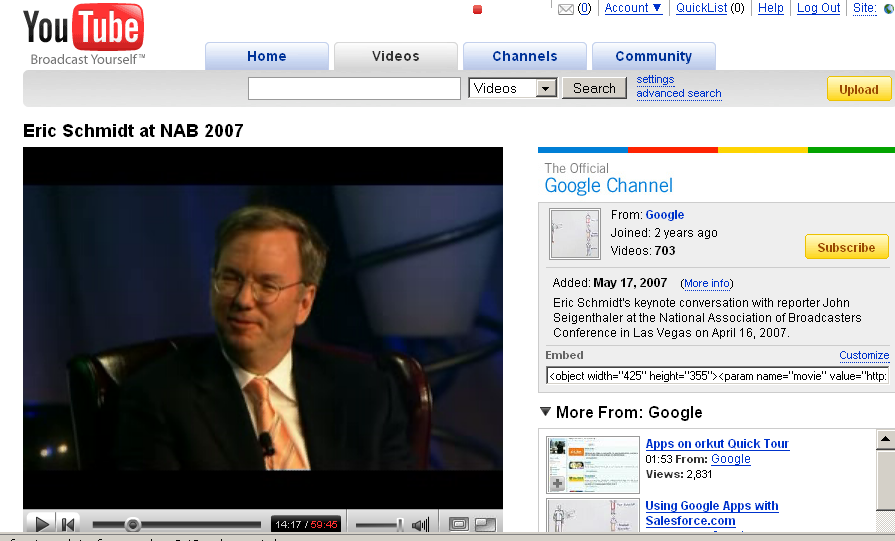YouTube's filtering issues still not 'moot'
A year after Google's CEO said an upcoming filtering system would render piracy a moot issue, video-sharing site is still home to plenty of unauthorized video.

LAS VEGAS--A year ago Wednesday, Google CEO Eric Schmidt delighted an audience of TV and radio broadcasters when he promised to roll out a system that would mean the end of piracy at YouTube.
"We are in the process of developing tools which are called 'Claim Your Content,'" Schmidt said at the National Association of Broadcasters 2007 conference. "If people tell us this is a licensed copy, our computers will automatically detect that an illegal copy has been uploaded and then automatically delete it."
Schmidt went on to say YouTube was "close to turning this (system) on" and once that happened, copyright violation at the site "becomes a moot issue." But following through on that promise has proven a challenge.
Executives with two entertainment companies that provide YouTube with feedback on its Video Identification system said the company's filtering technology has fared well at times but is nowhere near perfect and overall test results are "inconclusive." The sources, who requested anonymity because of the ongoing relationship with YouTube, added that managers at the video-sharing site continue to try and refine the system.
YouTube defended its efforts to protect copyright.
"Since launching in October, our Video Identification system has shown terrific results in its comprehensiveness, accuracy, and scalability," a YouTube spokeswoman said in an e-mail. "Over 100 partners from independent content creators to large media companies are currently using Video ID to easily manage their content. Many have found it to be a helpful tool in generating revenue and exposure for their content in the world's largest online video community."
For a long time, numerous copyright owners accused YouTube and Google of profiting from piracy and deliberately dragging their feet in developing a way to cleanse the site. They argued that the availability of professionally created content--uploaded by users--is what draws people to YouTube and without that the site would lose much of its luster. YouTube has always denied the accusations.
Nonetheless, the controversy has damaged some of Google's relationships in Hollywood.
Viacom, parent company of MTV and Paramount Pictures, filed a $1 billion lawsuit against Google last year. That case is expected to last years before being resolved and it could help decide what, if anything, a Web site's responsibilities are when it comes to policing for copyright violations.
Copyright clips abound
Certainly at this point, it's hard to see much change at YouTube since launching Video ID.
Available on the site are literally countless clips from feature films and TV shows produced by small production companies as well as the largest entertainment conglomerates--including Viacom.
Key into YouTube's search field the names of the last five Academy Award winners in the best picture category and scenes from each will appear. Want to watch the first 10 minutes of the gangster flick, The Departed? They're there. Someone else posted a series of 12 separate scenes from the film, presumably to get around YouTube's 10-minute clip limit.
Fans of Clint Eastwood's Million Dollar Baby can watch the "Mo cuishle" episode on YouTube as well as the coin toss scene from last year's best picture winner No Country For Old Men.
Identifying video is not easy, YouTube execs have long said. About 10 hours of video is uploaded to the site every minute. In addition to policing an enormous volume of video, YouTube must first obtain high-quality copies so it can create a digital fingerprint of the film or show. Ideally, the automated system will recognize when someone uploads an unauthorized copy.
While copyright videos are still plentiful on YouTube, there are seemingly fewer complaints from Hollywood. The sources who are part of YouTube's testing say the entertainment industry has shown a willingness to give YouTube time to improve filtering.
Some content owners may have also concluded that some degree of piracy is inevitable.
"We still see our content pop up on YouTube," CNN.com Executive Producer Sandy Malcolm told the Associated Press this week. "You deal with it. You try to work with them on rights and things, but I don't think you can completely stop it. You just try to beat the tide and try to get your content out as fast as you can."
Google execs continue to say they respect copyright and are working to protect it. Schmidt said protecting copyright was in Google's best interest.
"We are critically dependent upon the production of copyright content," Schmidt told the NAB audience a year ago. "Literally, people come to Google to get to somewhere where there is something of value. It's very important that we not violate copyright."

